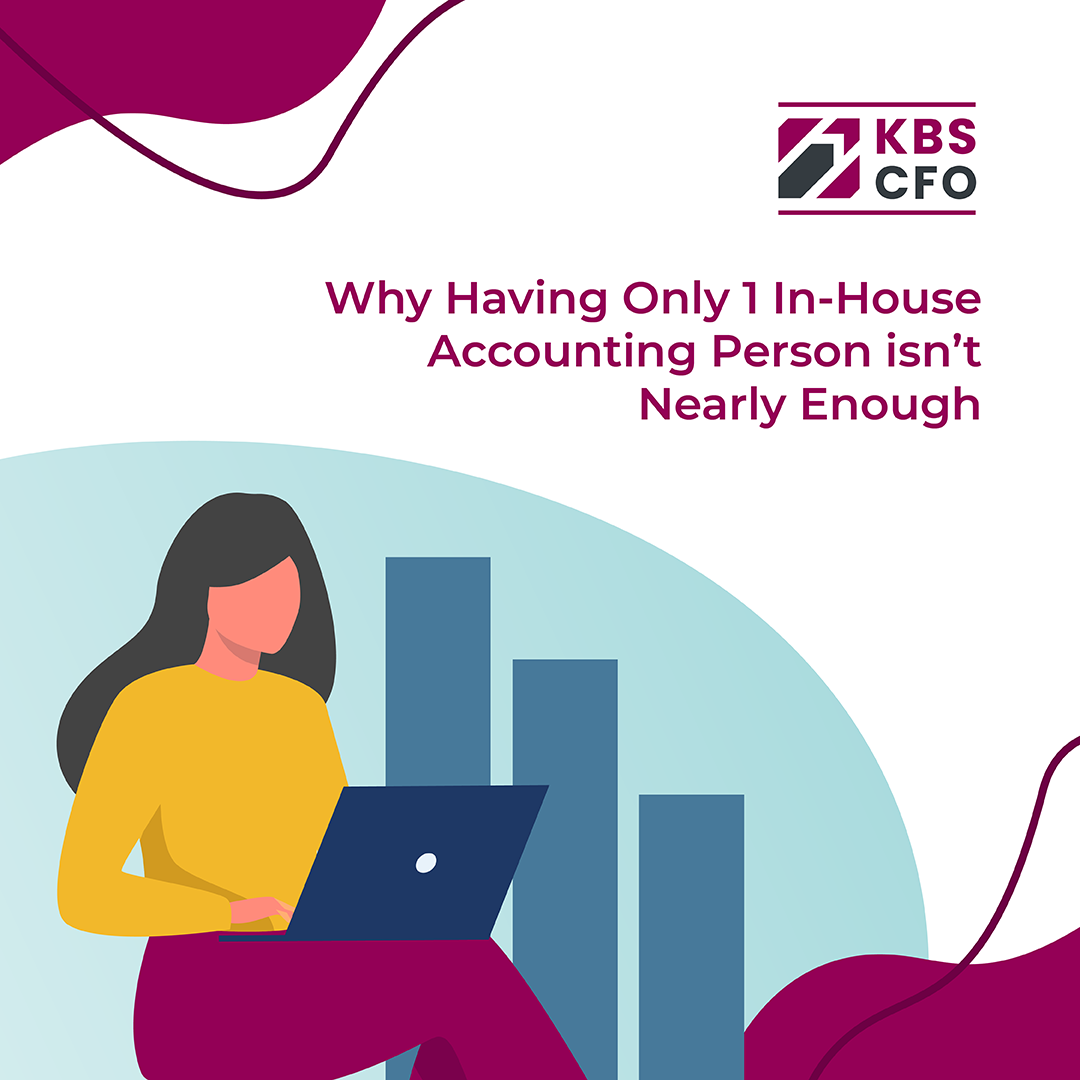Blog

Why Having Only 1 In-House Accounting Person isn’t Nearly Enough
Business owners start out wearing all the hats. They head up sales, marketing, operations, and client services. They are visionaries, task masters, go-getters, and rainmakers. And when they succeed and their business grows, they eventually put on a Human Resources hat that allows them to take a few of the others off.
Operations is a side of the business that founders and CEOs often staff up first. This frees them up from some of the doing so they can focus on the value that they alone bring to the table. A common first hire? An in-house accounting role.
That’s a great start, to be sure. But if you think that having only one in-house accounting person is enough, think again. In this article you’ll learn why this single-role approach has inherent limitations and challenges and the hire you need to make to solve those growth-inhibiting problems.
The Burden of Multiple Accounting Roles
When you hire someone to run your entire accounting department, you are charging a single person with multiple functions and responsibilities. They are tasked with being your CFO, Accounting Manager, and Transaction Specialist, all roles that are vitally important to the viability and success of your business.
But here’s the thing. Those are widely divergent responsibilities that require different skill sets, aptitude, experience, and abilities. Here’s a broad strokes overview of what each role requires.
CFO:
- Strong financial acumen with in-depth understanding of financial principles, accounting practices, and financial analysis
- Ability to develop and execute financial strategies that align with business goals
- Leadership and management experience to guide financial decision-making
- Risk management proficiency to mitigate financial risks and uncertainties
- Problem-solving to identify financial problems and provide innovative solutions
- Compliance and regulatory knowledge to ensure adherence to relevant laws
Accounting Manager:
- Expertise in financial accounting principles and financial reporting
- Strong attention to detail to maintain accurate financial data
- Organizational skills to manage multiple tasks and deadlines effectively
- Capability to resolve complex accounting problems and discrepancies
- Familiarity with accounting software and financial systems
- Ability to meet required financial standards related to compliance
Transactional Specialist:
- Proficiency in specific accounting tasks like accounts payable, accounts receivable, or payroll
- Attention to detail to accurately input financial data into accounting systems
- Ability to manage time in handling multiple transactions and meet deadlines
- Capability to problem-solve issues related to financial transactions
- Ensuring compliance with procedures and regulations in their area of expertise
- Knowledge of relevant accounting software and tools
If you endeavor to find someone who has all of the necessary skills, knowledge, and expertise to manage all of that and more, you best start your search at the base of a rainbow because what you need is a unicorn.
And even if you are lucky enough to find that mythical creature, you’ll soon find that the burden of playing multiple roles is far too much for even a magical person to bear. Remember what it felt like to be the one wearing every hat in your business? Expecting one person to successfully excel in three vastly different accounting roles simultaneously is impractical at best and irresponsible at worst.
Just run the numbers (pun intended). No one person can fulfill these roles. The single person accounting team is a recipe for burnout, turnover, and results that hit your bottom line in the worst ways. Instead, fill your business’s bench with specialized talent who can provide what you need according to your business’s unique needs in terms of time and attention. And the talent pool for such work, on a remote and part-time basis, is vast.
The Key Missing Piece: A Fractional CFO
A fractional CFO is someone who brings all of the strategy, experience, and expertise your business needs on a part-time basis. Businesses of every size benefit from what a CFO provides. But not every business needs a full-time, in-house CFO. This is where the fractional CFO role becomes a game changer.
The contributions of a fractional CFO go well beyond traditional accounting tasks. They serve as a financial partner, guiding your business’s leadership through strategic planning, financial analysis, and decision-making. Their insights can be transformational, driving business growth, improving profitability, and setting the stage for long-term success.
Engaging the services of a fractional CFO can be the key missing piece to sustainability, strategic growth, and viability for your business. And we can help. The dynamic team at KBS provides strategic guidance and innovative system-based solutions to entrepreneurs across various industries. And yes, we do it on a fractional basis.
Want to know more about how the KBS CFO team can help your business? Visit our site today to take the first step towards making sense of your financials and realizing your dreams.
